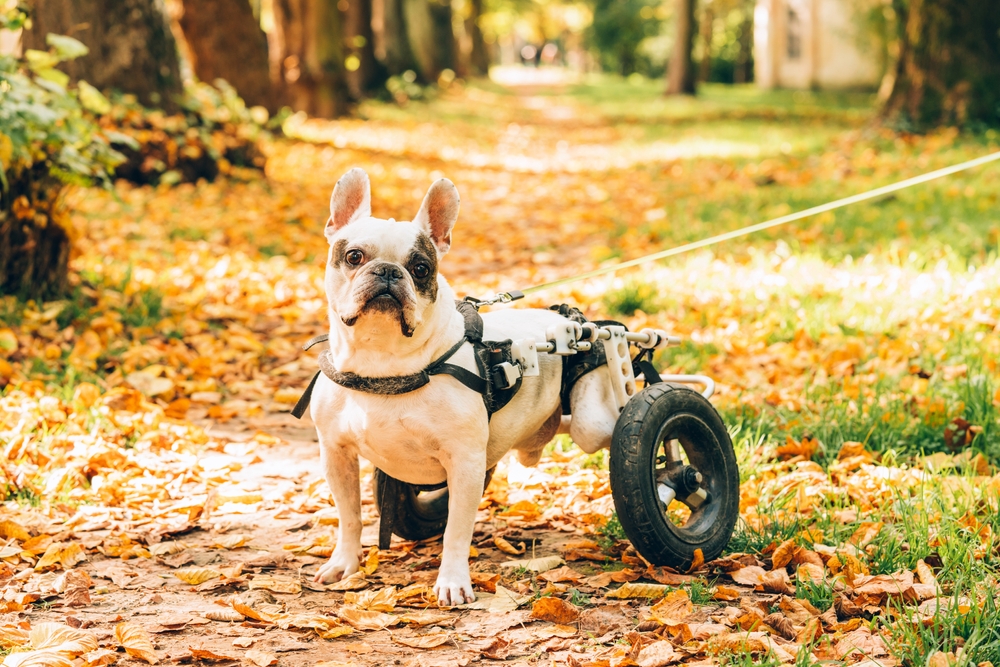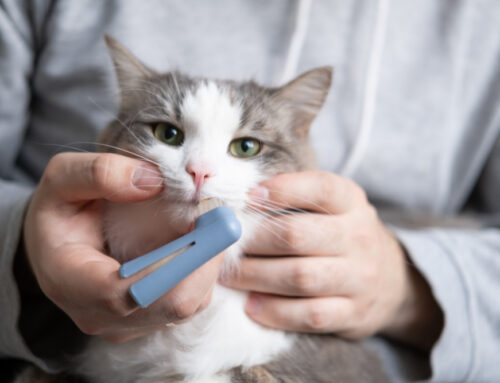American dog owners have fallen head over heels for a French wrinkled wonder. In 2022, the French bulldog surpassed the Labrador retriever as the number one American Kennel Club (AKC) registered dog breed—ending the Labrador’s historic 31-year reign.
However, despite their compact size and charming family-friendly personality, the French bulldog (i.e., Frenchie) isn’t a perfect fit for every home. And the same features that give Frenchies their trademark look can threaten their long-term health.
Whether you’re considering a French bulldog for your next pet or you already share your life with this fun-loving breed, the Cane Bay Veterinary Clinic team wants you to know about the seven most common French bulldog health problems.
#1: French bulldogs and brachycephalic obstructive airway syndrome
The French bulldog has a brachycephalic skull (i.e., broad and short, which creates a flat appearance, with a nearly non-existent muzzle). Unfortunately, these distinctive features have altered the breed’s airway (i.e., the nasal cavity, nostrils, palate, larynx, and trachea). As a result, French bulldogs can experience a number of airway abnormalities that affect breathing and oxygenation—collectively referred to as brachycephalic obstructive airway syndrome (BOAS). Your Cane Bay Veterinary Clinic veterinarian can screen your French bulldog for BOAS problems, which include:
- Nose — Stenotic nares (i.e., narrow or closed-down nostrils)
- Soft palate — Elongated soft palate
- Trachea — Hypoplastic (i.e., narrow) trachea or windpipe
- Everted saccules — Small tissue bodies that sit on either side of the trachea may be drawn down into the airway, creating airflow resistance
Affected pets are at risk for respiratory distress, because increased effort is required to move air in and out to cool the body.
#2: French bulldogs and obesity
The French bulldog’s short, stocky stature and irresistible charm predispose the breed to weight gain. Excess weight increases their risk for life-altering conditions, including arthritis, cancer, diabetes, respiratory problems, and heart disease.
French bulldog owners should strive to keep their dogs fit and active by feeding only the recommended daily calories and consistently providing low-impact exercise, such as brisk walks and toy play. If you need help determining how much your Frenchie should eat per day or how to help them lose weight, contact your Cane Bay Veterinary Clinic veterinarian.
#3: French bulldogs and heat sensitivity
The French bulldog’s compact muzzle and narrow airway can hinder their panting, which keeps them cool. Increased respiratory effort (e.g., labored breathing, heavy panting) and overexcitement can also raise the dog’s internal temperature and further increase their risk for heat distress or life-threatening heatstroke.
French bulldogs and other brachycephalic breeds should be kept indoors during hot weather and never left unattended outdoors or in a parked vehicle. BOAS-affected dogs can experience heat-related emergencies during mild weather (e.g., 70 degrees), so avoid high-impact activity or excitement and always supervise your dog outside. Return indoors immediately if you see your dog showing early heatstroke warning signs, such as rapid panting, high heart rate, loss of coordination, discolored gums, lethargy, or weakness.
#4: French bulldogs and dental disease
The French bulldog’s broad “smile” and adorable undershot jaw (i.e., underbite) may look cute, but these features hide an increased dental disease risk.
The Frenchie’s wide but short jaw contributes to many dental abnormalities, including malocclusion (i.e., misaligned bite) and crowding, because the teeth rotate during eruption. This creates additional crevices for plaque and tartar, which can accelerate periodontal (i.e., dental) disease and lead to chronic pain, infection, tooth loss, and ultimately, organ damage.
Care for your French bulldog’s dental health by brushing their teeth daily, feeding a dental diet, and scheduling routine dental cleanings and dental X-rays under anesthesia at Cane Bay Veterinary Clinic.
#5: French bulldogs and allergies
French bulldogs are predisposed to environmental allergies and food sensitivities or allergies, which can result in chronic ear or skin infections, respiratory signs, itchy or irritated skin, and digestive upset (e.g., vomiting, diarrhea, loose stool, weight loss, or flatulence). Unfortunately, allergies are chronic and incurable and can be difficult to diagnose, although your veterinarian can help you manage your dog’s discomfort.
#6: French bulldogs and cardiac problems
French bulldogs are susceptible to several congenital heart defects, including mitral regurgitation and pulmonic stenosis, which may present as a heart murmur during your initial visits to Cane Bay Veterinary Clinic when your Frenchie is a puppy. French bulldog heart conditions can be life-threatening, and affected dogs should be referred to a veterinary cardiologist for full evaluation and, in some cases, surgical correction.
Adult Frenchies may develop dilated cardiomyopathy (i.e., enlarged heart) or heart-based tumors.
#7: French bulldogs and spinal problems

French bulldogs are commonly born with abnormally shaped vertebrae that can predispose them to spinal cord injuries and chronic intervertebral disc disease (IVDD). Herniated or slipped discs can cause severe pain and sudden weakness or paralysis and dogs often need surgery to relieve the pressure and preserve spinal function.
Reduce your Frenchie’s IVDD risk by avoiding high impact activity (e.g., repetitive jumping) and keeping them at a lean and healthy weight.
French bulldogs are effortlessly cute, but they’re also a labor of love. If you’re interested in adopting a French bulldog, first do your research. Contact the French Bulldog Club of America to find a vetted and reputable breeder who completes appropriate health testing.
To schedule an appointment for your French [bulldog] love connection, contact the Cane Bay Veterinary Clinic team.







Leave A Comment